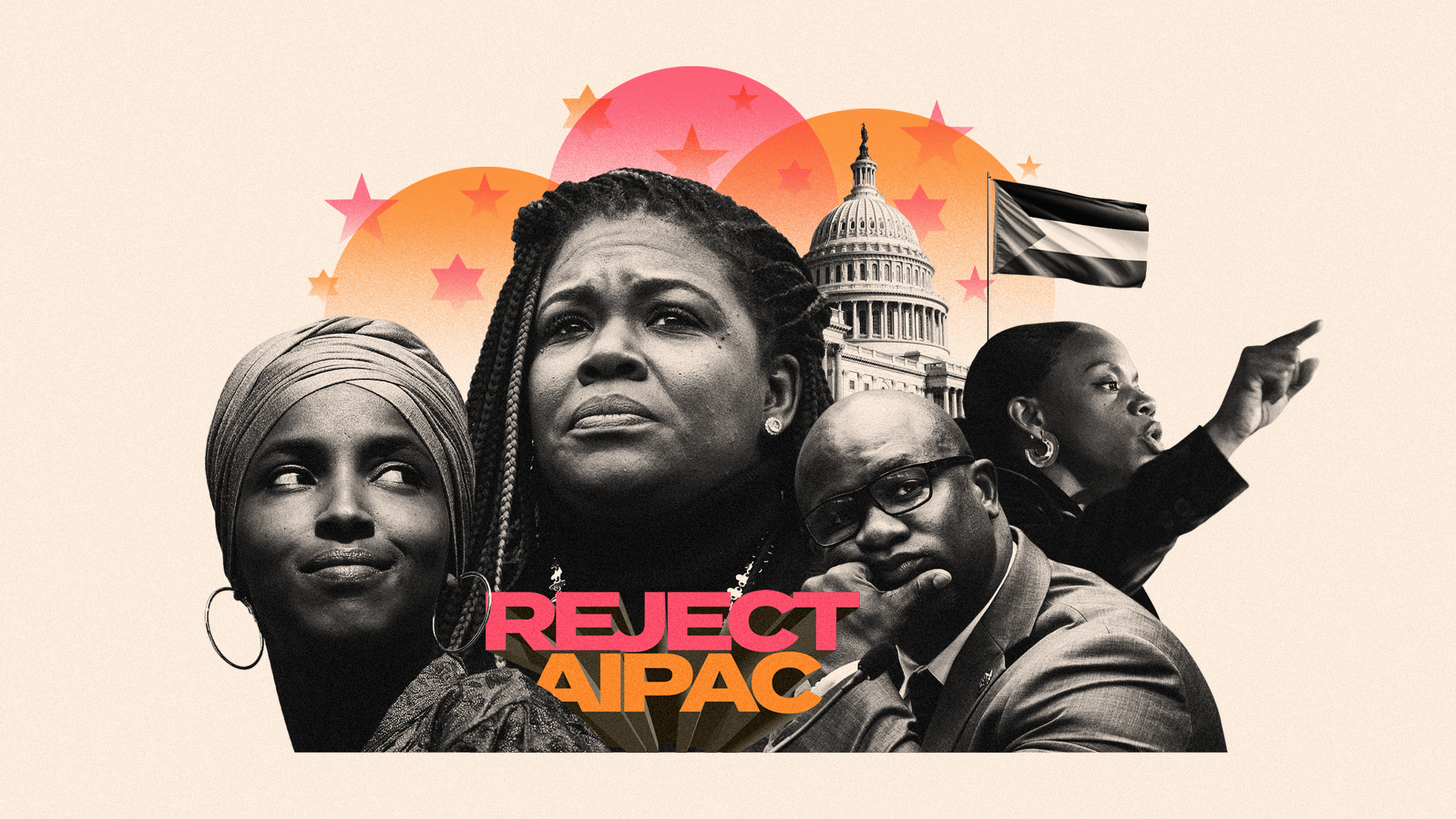New coalition goes after the mighty lobbying power of AIPAC
Reject AIPAC, a collection of more than 20 progressive groups, works to shield lawmakers critical of Israel's war on Gaza


A free daily email with the biggest news stories of the day – and the best features from TheWeek.com
You are now subscribed
Your newsletter sign-up was successful
This month, more than two dozen progressive organizations announced the formation of a new initiative designed to counteract what they called the "destructive influence of the Republican megadonor-backed AIPAC on the Democratic primary process and our government's policy towards Palestine and Israel." This newly formed Reject AIPAC coalition is comprised of left-leaning groups including Justice Democrats, Sunrise Movement, Jewish Voice for Peace Action, Our Revolution, and Jews for Racial and Economic Justice. It has called on candidates for federal office not to "take endorsements or contributions from AIPAC and/or aligned PACs" as Israel's ongoing war in Gaza has renewed attention on the infamous lobbying juggernaut. In a statement to The Guardian, Reject AIPAC accused AIPAC of doing "everything it can to silence growing dissent in Congress against Netanyahu's assault on Gaza" despite significant calls for a ceasefire from Democratic voters.
Through its United Democracy Project Super PAC, AIPAC's "biggest targets are members of the so-called Squad of progressive House Democrats" including Ilhan Omar (D-Minn.), Rashida Tlaib (D-Mich.), and Jamaal Bowman (D-N.Y.), although its "ambitions are broader" Politico said. The group is reportedly prepared to spend $100 million this election cycle and is monitoring "15 to 20 House races and polling in many of those districts." For the Reject AIPAC coalition, counteracting that enormous financial clout is a "crucial step in putting voters back at the center of our democracy," a spokesperson told The Intercept, explaining that Super PACs as a whole have "expanded the gap between voters and their elected leaders."
'A collective and focused effort'
Reject AIPAC has wasted little time since its formation this month, with plans underway for a "seven-figure campaign of paid media and field organizing." This will defend lawmakers up for reelection who have "taken pro-Palestinian stances that have put them in the pro-Israel lobby's crosshairs," The 19th said. Representatives from the groups involved in the coalition acknowledge that Reject AIPAC will likely never match their namesake's financial prowess. "What we have on our side, though, is that what we are representing is what most American voters actually want," Jewish Voice for Peace Action Political Director Beth Miller said to Al Jazeera. While AIPAC has long been scrutinized for its lobbying power, this new coalition "marks a collective and focused effort against the pro-Israel group," Al Jazeera said.
The Week
Escape your echo chamber. Get the facts behind the news, plus analysis from multiple perspectives.

Sign up for The Week's Free Newsletters
From our morning news briefing to a weekly Good News Newsletter, get the best of The Week delivered directly to your inbox.
From our morning news briefing to a weekly Good News Newsletter, get the best of The Week delivered directly to your inbox.
The group's work will center on "promoting pro-Palestinian members and candidates as well as highlighting national polling that shows that the majority of Democratic voters are aligned with their stances" against AIPAC's uniform support for Israel in the Gaza war, The Associated Press said. It also hopes to highlight the right-wing financial support AIPAC enjoys, and the fact that it has "endorsed dozens of the same Republicans who attempted to overturn Joe Biden's victory in the 2020 presidential election," The Guardian said. To that end, Reject AIPAC is "attempting to draw parallels between AIPAC and explicitly right-wing lobby groups like the National Rifle Association," Israel's Haaretz said.
AIPAC is 'evolving with the times'
AIPAC itself has defended its lobbying and campaign spending efforts, saying to Axios that it is "entirely consistent with progressive values to stand with the Jewish state," and touting the claim that its "political action committee supports nearly half of the Congressional Progressive Caucus, Black Caucus and Hispanic Caucus." Although Reject AIPAC's seven-figure "electoral defense campaign" is a "substantial sum in any congressional primary," it remains a "far cry from the nine figures AIPAC is planning to spend," Axios said.
Earlier this month, AIPAC members and donors met with lawmakers from both parties, "including Democrats who identify as progressive, to seek support for" continued congressional aid to Israel, The New York Times said. "Most people are not purely liberal or purely conservative," one attendee at a recent AIPAC conference told the paper, and the group is "evolving with the times."
Progressive groups have run a similar game plan against AIPAC in the past, most recently in 2022, Semafor said. In that case, the "effectiveness of the approach was mixed," in part because "Israel simply wasn't a burning issue in that campaign."
A free daily email with the biggest news stories of the day – and the best features from TheWeek.com
Ultimately, AIPAC's influence and finances suggest it's "becoming an existential threat for progressives, who are bracing to be hit hardest," Politico said.
Rafi Schwartz has worked as a politics writer at The Week since 2022, where he covers elections, Congress and the White House. He was previously a contributing writer with Mic focusing largely on politics, a senior writer with Splinter News, a staff writer for Fusion's news lab, and the managing editor of Heeb Magazine, a Jewish life and culture publication. Rafi's work has appeared in Rolling Stone, GOOD and The Forward, among others.
